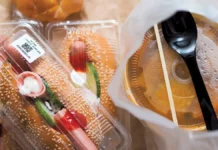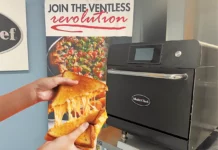
Contributed by Kari Hensien, President of RizePoint
Almost every food service business is still in the mode of “trying to keep the doors open.” It is a virtually universal stance, but is it enough to survive this crisis? And what happens when the next crisis appears?
New trends since COVID-19 are signaling that keeping the status quo of reactive policies alone — such as “just keeping the doors open” — is not enough moving forward. In fact, I believe that this pandemic has accelerated the need for proactive policies and modernization of quality initiatives to a place that the industry previously expected to happen five to ten years from now.
I like the way Brain Chesky, Chief Executive at Airbnb, recently spoke about the urgency around the need for customer service-heavy industries to adapt quickly and more proactively: “I did not know that I would make 10 years’ worth of decisions in 10 weeks.”
Below are four reasons why you need to modernize faster in our new normal, including tips about where to start:
1. You need dynamic, real-time insights, not static, point-in-time snapshots.
Both FSMA and the New Era of Smarter Food Safety state that you need to produce information to the FDA within 24 hours of when it was requested. That alone is incredibly difficult to do, if not impossible, with manual processes such as spreadsheets and email chains.
Before the pandemic, forward-thinking companies were already moving toward more software-based solutions for quality programs. But COVID-19 has made it clear that the demand for complete public transparency about customer safety, employee safety, and other quality initiatives show that modernization needs to happen faster.
Where to start: Manual solutions are too slow and prone to human error, so tech-based solutions are the only way to meet these demands (and more). There are many quality management system software solutions that not only help you manage all your quality data, but they also include built-in analytics, so you can get real-time insights and make data-based decisions.
2. You need more data than yearly corporate audits give.
I don’t think corporate audits will ever disappear, but the customer data at my company, RizePoint, is telling us an interesting story about companies diversifying audit types, so they can get more data faster (AKA dynamic, real-time insights).
Compared to 2015, our customers are doing fewer corporate audits and more location self-audits during the year to both supplement corporate audits and to create a faster checks and balances (or continuous quality) system. Additionally, companies are conducting more virtual, video-based audits to make-up for travel restrictions and to support the health and safety of auditors.
Where to start: Yes, I sound like a broken record, but this again shows that modernizing your programs with tech is a must. If you’re doing more self-audits, you’re getting an influx of data on a weekly, or even daily, basis. Manually receiving, compiling, and finding insights with that amount of new data is unviable as a long-term solution. It’s simply far too much for the average quality management team to handle, even if they have the budget to hire new headcount.
3. You need a stronger, more proactive food safety culture.
Modernizing with tech isn’t the only thing you can do. One of the biggest trends food industries are talking about is the increased importance of food safety culture now that every customer has your business under scrutiny. Employees need to understand why they’re doing what they are doing, and they need to know they aren’t going to be punished for pointing out problems at a location.
However, using software to reinforce food safety culture initiatives and enhance training has its advantages. For example, updating policies across all locations is a matter of updating it once in a quality management system software. No need for PICs to switch out paper checklists or posters, because everyone can access the most up-to-date information in a single source of truth.
Where to start: The goal here is to start using more proactive methods instead of reactive habits within your quality programs. When everyone has rules and best practices at their fingertips, and when they feel empowered and supported, each employee can become an extension of your chief quality officer (or equivalent) in managing and protecting the day-to-day compliance of quality programs. If employees know what needs to be done, they can proactively bring up or fix any noncompliance with confidence.
4. You need to do more within the same budget you had before COVID-19.
I know that investing in tech doesn’t sound like a reality for many quality teams. Budgets for quality initiatives are likely not changing in 2021, but you still must meet the demands of the new normal and a modernizing world. This is the time where quality teams can use creative thinking.
Where to start: One of the best things you can do is assess what your current quality programs look like versus what they need to become. Then when you look for tech solutions, make sure you find software that can encompass the lion’s share of your programs and avoid “point solutions” that do only one thing, such as checklist apps. This way you can solve multiple challenges with one investment.
Additionally, you may be able offset software costs by requiring suppliers to use your software to submit documents and certifications then charging them appropriate fees. Another plus side to this is that you’ll be able to communicate and collaborate with suppliers more quickly and on a deeper level.
As the food service industry considers and responds to the demands of COVID-19 and FDA requirements, it is increasingly clear that modernization with software-based solutions must happen at a faster pace than anyone anticipated. Using software to move toward a model of continuous quality with more frequent self-audits, real-time insights, proactive quality programs, a strengthened food safety culture, and creative thinking is the clear way forward in our new normal.
 As President of RizePoint, Kari Hensien is championing a new continuous quality initiative. Since travel and interpersonal interactions have been devastated by COVID-19, it’s been challenging for businesses to obtain regular third-party audits, which are integral to access and analyze key data and ensure safety compliance across the enterprise. Kari is facilitating an increased self-assessment auditing model, where businesses and their locations can use RizePoint’s digital platform themselves, resulting in more frequent audits and broader visibility during the pandemic and beyond. For more information or to discuss RizePoint’s solutions, please contact Kari at kari.hensien@rizepoint.com
As President of RizePoint, Kari Hensien is championing a new continuous quality initiative. Since travel and interpersonal interactions have been devastated by COVID-19, it’s been challenging for businesses to obtain regular third-party audits, which are integral to access and analyze key data and ensure safety compliance across the enterprise. Kari is facilitating an increased self-assessment auditing model, where businesses and their locations can use RizePoint’s digital platform themselves, resulting in more frequent audits and broader visibility during the pandemic and beyond. For more information or to discuss RizePoint’s solutions, please contact Kari at kari.hensien@rizepoint.com























